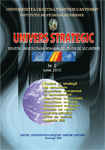ZONA EXTINSĂ A MĂRII NEGREU - O POSIBILĂ SINERGIE DE VALORI, POTENȚIALURI ȘI INTERESE
THE BLACK SEA EXTENDED AREA – A POSSIBLE SYNERGY OF VALUES, POTENTIALS AND INTERESTS
Author(s): Gheorghe VăduvaSubject(s): Politics / Political Sciences, Security and defense, Politics and Identity
Published by: Universitatea Crestina "Dimitrie Cantemir"
Keywords: Black Sea; synergy; potentials; culture; traditionalism; interference; confluences;
Summary/Abstract: We have been re-discovering what has been known since Antiquity, in a way or another: the Black Sea Area – in the small dimension of the six seaside countries (Bulgaria, Georgia, Romania, Russia, Turkey, Ukraine), and in the wider one (seaside countries, the Republic of Moldova, the Caucasus countries, a part of the Danube countries, eventually the Balkan states, connected largely by Danube and the Black Sea) – has sometimes had a special place, both in the South-East European construction and in the Eurasian one. Sometimes, it has not been but a marginal area, derived from the history myriad and lost in the present mazes. The littoral states and the ones located around the second circle are carrying old civilizations, with remarkable contributions on the appearance of the Greek, Roman, Byzantine, and, later on, the European cultures, but also the Islamic one, and to the fracture or improvement of the fault line between religions and cultures. The schism from 1053, as well as the substances of the peaces from Westphalia, dated 1648, is also related with this region. This is also the area where one of the bloodiest ethnic-religious fractures is located, which generated, by the end of the Cold War, the wars within the former Yugoslavia area. We think that, in order to real change the Black Sea Synergy – a forceful and consistent European project, but also a risk requiring to be assumed –, it is necessary, first of all, to have a very good knowledge on the region, in its whole complexity, but especially on the constructive and culture generating one.
Journal: Revista Univers Strategic
- Issue Year: I/2010
- Issue No: 2
- Page Range: 103-115
- Page Count: 13
- Language: Romanian

